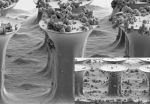(Press-News.org) Life is full of decisions. Some, like what to eat for breakfast, are relatively easy. Others, like whether to move cities for a new job, are quite a bit more difficult. Difficult decisions tend to make us feel stressed and uncomfortable – we don't want to feel responsible if the outcome is less than desirable. New research suggests that we deal with such difficult decisions by shifting responsibility for the decision to fate.
The findings are published in Psychological Science, a journal of the Association for Psychological Science.
"Fate is a ubiquitous supernatural belief, spanning time and place," write researchers Aaron Kay, Simone Tang, and Steven Shepherd of Duke University. "It exerts a range of positive and negative effects on health, coping, and both action and inaction."
Kay, Tang, and Shepherd hypothesized that people may invoke fate as a way of assuaging their own stress and fears – a way of saying "It's out of my hands now, there's nothing I can do."
"Belief in fate, defined as the belief that whatever happens was supposed to happen and that outcomes are ultimately predetermined, may be especially useful when one is facing these types of difficult decisions," they explain.
To test their hypothesis, the researchers capitalized on a current event of considerable significance: the 2012 U.S. presidential election.
They conducted an online survey with 189 participants and found that the greater difficulty participants reported in choosing between Obama and Romney (e.g., "both candidates seem equally good," "I am not sure how to compare the candidates' plans"), the more likely they were to believe in fate (e.g., "Fate will make sure that the candidate that eventually gets elected is the right one").
In a second online survey, the researchers actually manipulated participants' decision difficulty by making it harder to distinguish between the candidates.
Participants read real policy statements from the two presidential candidates – some read quotes from the candidates that emphasized the similarities in their policy positions, others read quotes that emphasized the differences.
As predicted, participants who read statements that highlighted similarities viewed the decision between the candidates as more difficult and reported greater belief in fate than the participants that read statements focused on differences.
"The two studies presented here provide consistent and converging evidence that decision difficulty can motivate increased belief in fate," write Kay and colleagues.
The researchers note that these findings raise additional questions that still need to be answered.
For example, do people invoke fate when they have to make decisions that are personally but not societally significant, such as where to invest money? And are we just as likely to invoke luck or other supernatural worldviews when faced with a difficult decision?
"Belief in fate may ease the psychological burden of a difficult decision, but whether that comes at the cost of short-circuiting an effective decision-making process is an important question for future research," the researchers conclude.
INFORMATION:
For more information about this study, please contact: Aaron C. Kay at aaron.kay@duke.edu.
The APS journal Psychological Science is the highest ranked empirical journal in psychology. For a copy of the article "Do Difficult Decisions Motivate Belief in Fate? A Test in the Context of the 2012 U.S. Presidential Election" and access to other Psychological Science research findings, please contact Anna Mikulak at 202-293-9300 or amikulak@psychologicalscience.org.
When faced with a hard decision, people tend to blame fate
2014-02-19
ELSE PRESS RELEASES FROM THIS DATE:
UK failing to harness its bioenergy potential
2014-02-19
The UK could generate almost half its energy needs from biomass sources, including household waste, agricultural residues and home-grown biofuels by 2050, new research suggests.
Scientists from the Tyndall Centre for Climate Change Research at The University of Manchester found that the UK could produce up to 44% of its energy by these means without the need to import.
The study, published in Energy Policy journal, highlights the country's potential abundance of biomass resources that are currently underutilised and totally overlooked by the bioenergy sector. Instead, ...
Making nanoelectronics last longer for medical devices, 'cyborgs'
2014-02-19
The debut of cyborgs who are part human and part machine may be a long way off, but researchers say they now may be getting closer. In a study published in ACS' journal Nano Letters, they report development of a coating that makes nanoelectronics much more stable in conditions mimicking those in the human body. The advance could also aid in the development of very small implanted medical devices for monitoring health and disease.
Charles Lieber and colleagues note that nanoelectronic devices with nanowire components have unique abilities to probe and interface with living ...
Gecko-inspired adhesion: Self-cleaning and reliable
2014-02-19
This news release is available in German. Geckos outclass adhesive tapes in one respect: Even after repeated contact with dirt and dust do their feet perfectly adhere to smooth surfaces. Researchers of the KIT and the Carnegie Mellon University, Pittsburgh, have now developed the first adhesive tape that does not only adhere to a surface as reliably as the toes of a gecko, but also possesses similar self-cleaning properties. Using such a tape, food packagings or bandages might be opened and closed several times. The results are published in the "Interface" journal of ...
Chemical leak in W.Va. shows gaps in research, policy
2014-02-19
The chemical leak that contaminated drinking water in the Charleston, W.Va., area last month put in sharp relief the shortcomings of the policies and research that apply to thousands of chemicals in use today. An article in Chemical & Engineering News (C&EN), the weekly magazine of the American Chemical Society, delves into the details of the accident that forced 300,000 residents to live on bottled water for days.
A team of C&EN reporters and editors note that the main chemical that leaked into the water supply is an obscure one called 4-methylcyclohexanemethanol, or ...
Advance in energy storage could speed up development of next-gen electronics
2014-02-19
Electronics are getting smaller all the time, but there's a limit to how tiny they can get with today's materials. Researchers now say, however, that they have developed a way to shrink capacitors — key components that store energy — even further, which could accelerate the development of more compact, high-performance next-gen devices. The study appears in the journal ACS Nano.
Takayoshi Sasaki and colleagues point out that many recent improvements have already downsized capacitors significantly. But current technology has almost reached its limit in terms of materials ...
Genetics linked to children viewing high amounts of violent media
2014-02-19
Washington, DC (February 19 2014) – The lifelong debate of nature versus nurture continues—this time in what your children watch. A recent paper published in the Journal of Communication found that a specific variation of the serotonin-transporter gene was linked to children who engaged in increased viewing of violent TV and playing of violent video games.
Sanne Nikkelen, Helen Vossen, and Patti Valkenburg of the University of Amsterdam's School of Communication Research, in collaboration with researchers at the Erasmus University Medical Centre in Rotterdam, analyzed ...
Special air filter blocks small particles called UFPs from getting inside cars
2014-02-19
While taking in the scenery during long road trips, passengers also may be taking in potentially harmful ultrafine particles (UFPs) that come into the car through outdoor air vents. Closing the vents reduces UFPs, but causes exhaled carbon dioxide to build up. Now, scientists report in the ACS journal Environmental Science & Technology that installing a newly developed high-efficiency cabin air filter (HECA) could reduce UFP exposure by 93 percent and keep carbon dioxide levels low.
Yifang Zhu and Eon Lee explain that most modern cars come with cabin air filters, but ...
Kinetic battery chargers get a boost
2014-02-19
New technology to capture the kinetic energy of our everyday movements, such as walking, and to convert it into electrical energy has come a step closer thanks to research to be published in the International Journal Biomechatronics and Biomedical Robotics.
Researchers have for many years attempted to harvest energy from our everyday movements to allow us to trickle charge electronic devices while we are walking without the need for expensive and cumbersome gadgets such as solar panels or hand-cranked chargers. Lightweight devices are limited in the voltage that they ...
A*STAR scientists discover protein's role in human memory and learning functions
2014-02-19
1. Scientists at A*STAR's Institute of Molecular and Cell Biology (IMCB) have identified the precise role of the protein, SNX27, in the pathway leading to memory and learning impairment. The study broadens the understanding of the brain's memory function and could be used to explain defects in the cognitive development of those with Down's syndrome. The newly established knowledge could potentially facilitate exploration of strategies to improve memory and learning abilities in Down's syndrome.
2. Down's syndrome is a genetic condition characterized by the presence ...
Could metabolism play a role in epilepsy?
2014-02-19
VIDEO:
The Kuehner lab demonstrates their drug-screening technique in JoVE's peer-reviewed video format to aid other researchers in the field.
Click here for more information.
February 19—Researchers from the Franciscan University of Steubenville, Ohio are exploring a possible link between metabolic defects and seizures. They determined that diet could influence susceptibility to seizures, and they have identified a common diabetes drug that could be useful in treating disorders ...

